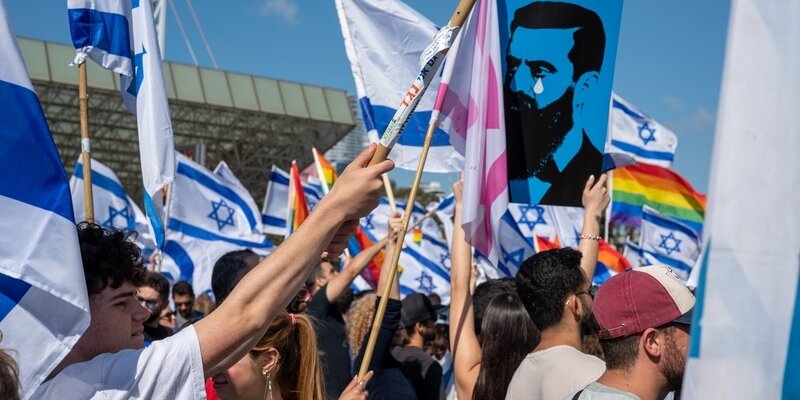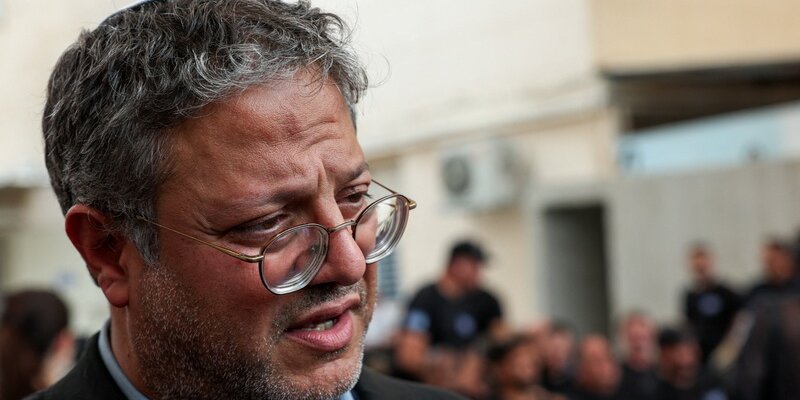What is the Hind Rajab Foundation, which is making Israeli soldiers fear arrest abroad?
The group has sent the names of more than 1,000 Israeli soldiers to the International Criminal Court in The Hague, but the ultimate problem is the lack of enforcement by Israeli authorities and the country's ensuing crisis of confidence around the world. Published also at N12 Magazine (Hebrew) and at Haaretz.com


The group has sent the names of more than 1,000 Israeli soldiers to the International Criminal Court in The Hague, but the ultimate problem is the lack of enforcement by Israeli authorities and the country's ensuing crisis of confidence around the world. Published also at N12 Magazine (Hebrew) and at Haaretz.com

The group has sent the names of more than 1,000 Israeli soldiers to the International Criminal Court in The Hague, but the ultimate problem is the lack of enforcement by Israeli authorities and the country's ensuing crisis of confidence around the world. Published also at N12 Magazine (Hebrew) and at Haaretz.com
Illustration: Reuters

Milan Czerny
January 10, 2025
Summary


Listen to a Dynamic Summary of the Article
Created using NotebookLM AI tool
All through the war in Gaza, Israeli soldiers have been leaving behind not only their physical footprints but also digital fingerprints, with many of them posting videos and photos of themselves online – and sometimes recording improper conduct and potential war crimes. This of course breaches regulations, but it has also happened in Lebanon and Syria – and some soldiers are now paying for it.
For many anti-Israel organizations seeking to bring Israeli soldiers to trial, these videos and photos are a digital treasure trove, with potential evidence of war crimes in the Gaza Strip. The activists are often able to figure out soldiers' precise geographic location, or even draw up detailed maps of events. For some, the next stage is to post soldiers’ personal details online, leaving them to the mercy of online groups that harass and threaten them.
The Belgium-based Hind Rajab Foundation is one such organization. In recent months, it claims it has sent the names of more than 1,000 Israeli soldiers to the International Criminal Court in The Hague, seeking to get them tried for war-crimes or charges of genocide, including Israelis with dual citizenship. It's one of the largest cases ever at the ICC.

Hind Rajab is also trying to get soldiers arrested when they go abroad. Whether it's Instagram, Telegram or Facebook, its activists notice when soldiers on leave post pictures of themselves on a Thai or Sri Lankan beach, or on a trip to a European capital. On a social media account, such snapshots might shortly follow videos of events in Gaza.
Armed with these posts, Hind Rajab makes highly-publicized calls for arrests and trials by the host country. Officials at Israel's Foreign Ministry – which along with the Justice Ministry did not comment for this article – are left without a plan, urging the soldiers to quickly leave the country before they could be arrested.
News organizations have reported about this happening in Cyprus and Sri Lanka, but it has also happened elsewhere. Soldiers and their families receive urgent calls from the Israeli authorities urging them to come back home. The Israel Defense Forces has reportedly warned around 30 soldiers and officers who have fought in Gaza against traveling abroad.
It's the fruit of the work of the anti-Israel activists behind the Hind Rajab Foundation, which is named after a 6-year-old girl who was killed in Gaza early last year, most likely by Israeli fire, as The Washington Post has reported. (The IDF has not taken responsibility for the incident.)
.jpeg)
A history of scandals and hatred of Israel
The Hind Rajab Foundation was established this past September. According to documents obtained by Shomrim, it is linked to the March 30 Movement, which locates Israeli soldiers around the world. This group is named after the day in 1976, now known as Land Day, when Israeli security forces shot dead six Arab Israelis who were protesting the expropriation of Arab-owned land in the north.
The two organizations are led by Dyab Abou Jahjah and Karim Hassoun, who both live in Belgium. Abou Jahjah was born in 1971 in the Lebanese village of Bint Jbeil, while Hassoun was born in 1979 in the Belgian town of Rumst.
Both are Islamic extremists who have expressed support for Hezbollah and have been put on a U.S. list of people required to undergo special security checks before flights, or are prevented from boarding flights to the United States or flights over it – a subset of the U.S. list of terror suspects.
He has described 9/11 as “sweet revenge” and celebrated Palestinian resistance “at all costs” after an attack that killed Israelis.
.jpeg)
Abou Jahjah, who heads the Hind Rajab Foundation, has a history of provocations. He was banned from entering Britain on allegations that he was an extremist, and he was also investigated in Belgium, mainly on allegations that he incited ethnic riots.
He has described 9/11 as “sweet revenge” and celebrated Palestinian resistance “at all costs” after an attack that killed Israelis.
He once told The New York Times that in the early 2000s he received military training from Hezbollah, but recently he has denied being a member of that group. Still, he expresses sympathy for the group’s military wing, adding that some of its leaders are his “friends.”

Before the establishment of the Hind Rajab Foundation, Abou Jahjah and Hassoun were already working for the Arab European League, which made headlines when it set up a small group that patrolled Antwerp on the lookout for “racist behavior” by the police. City prosecutors sought to investigate this initiative on suspicion that the Arab European League was a private militia.
The organization was also fined for publishing a caricature claiming that the Jews made up the Holocaust. Former members such as Fouad Belkacem from the Belgian-Muslim organization Sharia4Belgium later recruited hundreds of Belgian youths to jihadi groups in Syria.
Hassoun is also infamous for a raft of statements and gestures in the past. After the 2015 death of Hezbollah's Samir Kuntar, who murdered a family in northern Israel in 1979, Hassoun replaced his Facebook profile picture with a picture of Kuntar. In 2004, Hassoun arrived with a coffin wrapped in Islamic flags at the Mechelen memorial site – the transit camp from which tens of thousands of Jews were sent to death camps during the Holocaust.
Hassoun is currently an activist in the town of Willebroek, Belgium, where the very fact that he was on a party’s election slate for the city council helped block the forming of a municipal coalition.

'Everybody was posting pictures'
Israel, meanwhile, is relying on legal experts around the world to assess the risk of whether Israeli soldiers and officials might have to stand trial abroad. The IDF and the Foreign Ministry have even created a special department to handle such cases.
One Israeli soldier tracked by Hind Rajab told Shomrim how he had to flee a foreign country after allegations were made against him online. The consulate there and Israel's Foreign Ministry urgently contacted him and his family.
He says his parents were worried, and he himself quickly realized the risk, so he left. The soldier admits he was indiscreet in posting photos of himself in Gaza, but he says that “everybody posted pictures” and that the army gave no briefing on the possible consequences.
“It's very important to me that people learn from my case, that they realize that posting pictures from the army isn't helping us around the world,” he says.
Countries see a discrepancy between Israel's number of violations and the number of investigations it has opened.

But this isn't the root of the problem, which is the lack of enforcement by Israeli authorities and Israel's crisis of confidence with countries around the world, as noted by Prof. Vaios Koutroulis, an international law expert at Université libre de Bruxelles.
As he puts it, when Israel has relations of good faith with another country, the two can negotiate any given case and determine whether a soldier with dual citizenship should be investigated in Israel or the other country.
Now, he adds, countries see a discrepancy between Israel's number of violations and the number of investigations it has opened, so it is difficult to convince other countries that Israel is conducting thorough investigations that make foreign involvement unnecessary.
For example, in November, Haaretz reported that the IDF had indicted only 15 soldiers during the war in Gaza. Almost all of these cases involved theft, and none causing the deaths of detainees, for example.
For her part, the military advocate general has said that when it is made impossible to investigate possible war crimes in Gaza, all Israeli soldiers are put at risk.
Attorney David Benjamin, an international law expert and former senior officer at the military advocate general's office, says the IDF’s best defense against legal procedures abroad is for the IDF itself to deal with the issue “by actually investigating and, when necessary, by taking legal action here at home.” This would make it clear that any wrongdoings do not reflect IDF policy.
But right-wing organizations and individuals, including senior members of the governing coalition, complain bitterly when Israeli soldiers are accused of anything illegal, as they did, for example, in the case of the Sde Teiman army base, where soldiers are suspected of abusing detainees from Gaza. Some Israeli lawmakers stormed an army base in protest.
The right-wingers undermine the judiciary’s legitimacy to conduct independent inquiries essential for upholding the rule of law, especially during wartime and on the international stage.
.jpeg)
According to Koutroulis of the Université libre de Bruxelles, the Israeli government's actions surely aren't improving the chances of Israel’s investigations being taken seriously abroad. He notes that urging soldiers to flee trial may contradict Israel’s commitments to international agreements like the Geneva Conventions.
Israel will have to deal with this issue rather than escape it by urging its citizens to flee countries around the world.
No response was received from the Ministry of Foreign Affairs and the Ministry of Justice.













